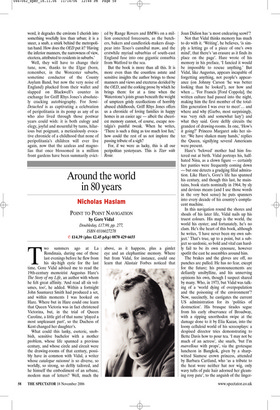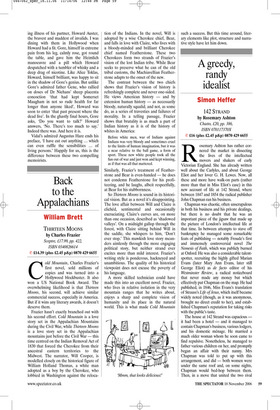Around the world in 80 years
Nicholas Haslam
POINT TO POINT NAVIGATION by Gore Vidal Doubleday, £17.99, pp. 277, ISBN 0316027278 ✆ £14.39 (plus £2.45 p&p) 0870 429 6655 Two summers ago at La Rondinaia, during one of those last evenings before he flew from his sky-high eyrie for the last time, Gore Vidal advised me to read the 19th-century memoirist Augustus Hare’s The Story of my Life, an author with whom he felt great affinity. ‘And read all six volumes, too’, he added. Within a fortnight John Saumarez Smith had produced a set, and within moments I was hooked on Hare. Where but in Hare could one learn that Queen Victoria was in fact christened Victorina, but, in the trial of Queen Caroline, a little girl of that name ‘played a most unpleasant part’, so the Duchess of Kent changed her daughter’s.
What could this lanky, esoteric, snobbish, sensitive bachelor with a mother problem, whose life spanned a previous century, and whose circle and circuit were the drawing-rooms of that century, possibly have in common with Vidal, a writer whose catalogue raisonné is so diverse, so worldly, so strong, so deftly tailored, and he himself the embodiment of an urbane, modern man of letters? Well, much the above, as it happens, plus a gimlet eye and an elephantine memory. Where but from Vidal, for instance, could one learn that Alastair Forbes noticed that Joan Didion has ‘a most endearing scowl’?
Not that Vidal thinks memory has much to do with it. ‘Writing’, he believes, ‘is simply a letting go of a piece of one’s own mind’, that there’s ‘an erasure as it finds its place on the page’. Hare wrote of his memory in his preface, ‘I fancied it would be impossible to rescue anything.’ But Vidal, like Augustus, appears incapable of forgetting anything, not people’s appearance (on Johnny Carson ‘he was better looking than he looked’), nor how and when ... ‘For Francis [Ford Coppola], the written culture had passed into the night, making him the first member of the totalfilm generation I was ever to meet’... and where and why (Garbo, most surprisingly, was ‘very rich and somewhat lazy’) and what they said. Gore deftly circuits the grandest of drawing-rooms. In one, ‘How’s it going?’ Princess Margaret asks her sister. ‘We have shaken many hands,’ replies the Queen, signifying several Americans were present.
Hare’s ‘beloved’ mother had him fostered out at birth. Vidal portrays his, halfhated Nina, as a clown figure — certainly her panties were frequently coming down — but one detects a grudging filial admiration. Like Hare’s, Gore’s life has spanned his century, and though this last, he maintains, book starts nominally in 1964, by sly and devious means (and I use those words in the very best sense) he puts spanners into every decade of his country’s complacent machine.
In this navigation round the shores and shoals of his later life, Vidal nails up his truest colours. His map is the world, the world his oyster; and fortunately, he’s no clam. He’s the heart of this book, although he writes, ‘I have never been my own subject.’ That’s true, up to a point, but a subject so sardonic, so bold and vital can hardly fail to be its own cynosure, however spotlit the cast he assembles around him.
The brakes and the gloves are off, no punches are pulled. He has no fear, except for the future; his pronouncements are defiantly unsibylline, and his unnerving opinions his own, though I suspect shared by many. Who, in 1973, but Vidal was talking of a ‘world dying of overpopulation and the poisoning of the environment’? Now, succinctly, he castigates the current US administration for its ‘politics of destruction’. His brusque tirades segue from his early observance of Broadway, with a ripping unorthodox swipe at the damage done to it by Elia Kazan, into the loony celluloid world of his screenplays: a despised director tries demonstrating to Bette Davis how to pour tea. ‘I may not be much of an actress’, she snarls, ‘but I’m marvellous with props’, via the grotesque luncheon in Bangkok, given by a sharpwitted Siamese crown princess, attended by Barbara Cartland, who ‘as a tribute to the heat wore neither hat nor wig, only wavy tufts of pale hair adorned her gleaming rosy pate’, to the anguish of the linger ing illness of his partner, Howard Auster, the bravest and maddest of invalids. I was dining with them in Hollywood when Howard had a fit. Gore, himself in extreme pain from his leg, calmly rose, got round the table, and gave him the Heimlich manoeuvre and a pill which Howard despatched with a tumbler of whisky and a deep drag of nicotine. Like Alice Toklas, Howard, himself brilliant, was happy to sit in the shadow of Gore’s genius. But unlike Gore’s admired father Gene, who rallied on doses of Dr Niehans’ sheep placenta concoction ‘that had kept Somerset Maugham in not so rude health for far longer than anyone liked’, Howard was soon to enter ‘that past present where the dead live’. In the ghastly final hours, Gore asks, ‘Do you want to talk?’ Howard answers, ‘No. There’s too much to say.’ Indeed there was. And here it is.
Vidal’s admired Augustus Hare ends his preface, ‘I have cut out anything ... which can even ruffle the sensibilities ... of living persons.’ Happily for us, this is the difference between these two compelling memoirists.



































































































 Previous page
Previous page